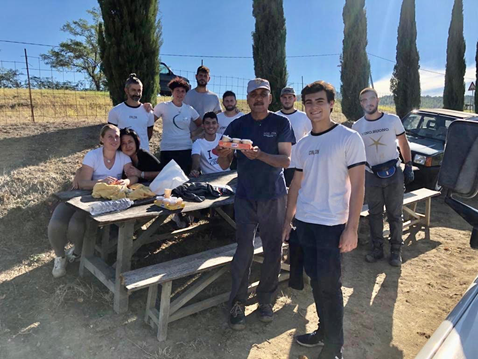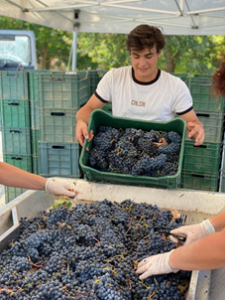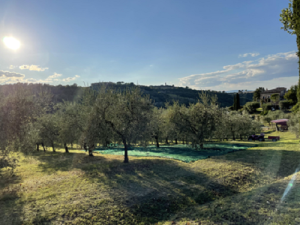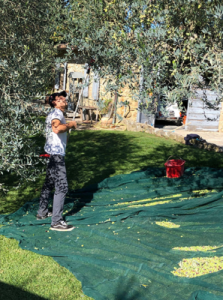Harvesting Wine Grapes and Olives: My Immersion into the Italian Culture

by Umbra Rep Timothy Ringie, University of Massachusetts Amherst
When I began planning out my study abroad experience over a year ago, the thing that captivated me the most was the idea of immersing myself in a new culture to which I was unaccustomed to. The thought of being surrounded by people speaking a different language, learning their customs and ways of life was something I knew I wanted to be a part of my study abroad experience. In just my first month here at the Umbra Institute I enjoyed such an immersive experience by participating in both the grape and olive harvests at a beautiful property located right in the heart of the Umbrian countryside. Owned and managed by Eileen and Lorenzo De Monaco, their operation, called “Agri Segretum”, produces local, handcrafted, and organic wine and olive oil. Eileen and Lorenzo pride themselves on their sustainability and commitment to creating natural organic products which taste as good as they sound. Their grapes are grown, harvested, crushed, fermented, aged, and bottled on-site, and all by hand as it has been done for centuries. The olives are also grown and hand-picked on site, and then brought to an olive mill where they are ground up and pressed into oil. In addition to their wine & olive oil production operations, Eileen and Lorenzo rent out two farmhouse buildings at their villa, called “La Segreta” which are nestled amongst the olive groves, vineyards, and directly adjacent to the Cantina where they produce the wine. I was lucky enough to have personal contact with them as Eileen is from the United States and a friend of my parents. In a previous visit to Italy I had the wonderful opportunity to stay at one of their quaint farmhouses, and now I’ve been able to begin my study abroad experience by partaking in their grape and olive harvests which have experiences far more enriching than I could have ever imagined.
 Grape Harvest and
Grape Harvest and
On just my fifth day after arriving in Perugia, I found myself right in the midst of an incredible and unforgettable immersive experience, the grape harvest. It began bright and early at 7:00 AM with a cappuccino and a bowl of cereal – an American twist in an otherwise completely Italian landscape. After breakfast, Lorenzo drove me a quick five minutes to where the majority of their grape vines are located. It was then that I was introduced to the team, or “la Squadra” in Italian. Even though my Italian is shaky at best, they invited me with open arms. They have a small dedicated staff who are employed at the vineyard full time, all locals of course. But I was in for a surprise when I realized that the majority of the people there were their friends and acquaintances from the surrounding towns. They are fathers, mothers, sons and daughters in their little town called Collazzone, who are recruited to help every harvest season. It felt like one big family and was so much fun to be a part of. I was paired with two women who helped me “learn the ropes”. I was proud of how I performed speaking Italian and enjoyed communicating with my new friends. It is amazing what is possible when thrust into a situation where you are forced to speak another language. During the grape harvest, we all walked down the rows of vines with hand pruners, individually cut each bunch of grapes from the vines and placed them in crates every ten to twenty feet. A tractor would drive through, with someone following behind, to pick up all the crates in the row. This tractor was the only mechanized part of the entire process, with everything else being done by hand. We took an espresso/lunch break around noon and just talked at a big picnic table at the edge of the vineyard. After picking for a few more hours, I went back to their cantina and helped put the grapes on a shaking table which lets any small debris fall through, while the larger material like leaves, sticks, and other undesirable material is picked out by hand. The grapes then fall into the crusher and then transferred directly into a steel vat where they will ferment for the next few weeks. The Sangiovese grapes which we picked are the staple grapes of central Italy. They will be used to make 4 different kinds of wine; 3 red and one rosé. Needless to say after this experience I was counting down the days until I could return again.
 Olive Harvest
Olive Harvest
Just a few weeks after the grape harvest I was able to return to La Segreta to help with their olive harvest. All of their roughly 500 olive trees are nestled right on the property with a spectacular view of the surrounding Umbrian hills. Their olive oil production is significantly smaller than the wine production as it takes roughly 5 kilograms, or around 11 pounds, of olives just to produce 1 liter of extra-virgin olive oil. That didn’t make the work any less grueling or exhausting though as again, everything is done by hand.
We started at a similar time in the morning, around 7:30 AM, however it was noticeably colder this time as there was a heavy fog that morning. I was excited to see all the familiar faces of “la Squadra” that I had met a few weeks prior. This time there was no need for introduction and I rushed to practice some more Italian with the locals and I might add they were just as eager to practice their English!
 The process for collecting the olives involves laying down large mesh tarps under an area of trees to collect the olives as they fall. A few workers were equipped with a long pole with motorized “fingers”, for lack of a better word, situated at the end which shook the branches of the tree causing the olives to fall down. The majority of us, however, used long rakes which comb over the branches, pulling off only the olives. My day consisted of traveling from area to area laying down the tarps, raking the trees clean of olives and loading them into crates to be picked up. We picked 3 classic types of Italian olives: Leccino, Moraiolo, and Frantoio; the blending of which creates the best extra-virgin olive oil I have tasted and certainly unlike anything I have ever tried. The color of which is a hazy-green and tastes as though it is filled with spices. By the time we finished working, I realized that I had learned a lot of the terminology that was used during the day, the Italian words for tarp, stake, box and rake to name a few. My evening concluded with two kinds of homemade cake that Eileen made and brought into the olive grove for all the workers. There we engaged in chit chat and watched the beautiful sunset below the Umbrian hills. I exchanged contact information with some of the workers with whom I plan to see again.
The process for collecting the olives involves laying down large mesh tarps under an area of trees to collect the olives as they fall. A few workers were equipped with a long pole with motorized “fingers”, for lack of a better word, situated at the end which shook the branches of the tree causing the olives to fall down. The majority of us, however, used long rakes which comb over the branches, pulling off only the olives. My day consisted of traveling from area to area laying down the tarps, raking the trees clean of olives and loading them into crates to be picked up. We picked 3 classic types of Italian olives: Leccino, Moraiolo, and Frantoio; the blending of which creates the best extra-virgin olive oil I have tasted and certainly unlike anything I have ever tried. The color of which is a hazy-green and tastes as though it is filled with spices. By the time we finished working, I realized that I had learned a lot of the terminology that was used during the day, the Italian words for tarp, stake, box and rake to name a few. My evening concluded with two kinds of homemade cake that Eileen made and brought into the olive grove for all the workers. There we engaged in chit chat and watched the beautiful sunset below the Umbrian hills. I exchanged contact information with some of the workers with whom I plan to see again.
A new way of life
The experience at “La Segreta” has been really eye opening. Not just because of the specifics related to grape/olive harvests or even the Italian words, phrases and conversation that I have picked up on. But more profoundly, I have learned about and experienced a completely different way of life and culture. I’ve been exposed to a business operation where product quality – rather than profits or volume – is put at the forefront. I have taken part in a way of life where past traditions are blended with the present. And perhaps most importantly, I’ve experienced a way of life where community and family rise above all else. It truly felt like one large family out in the fields, with everyone joking and laughing, telling inside jokes after years of harvesting grapes and olives together. It was a wonderful experience, one which I will never forget.
If I could give any advice to anyone studying abroad, it would be to immerse yourself in the culture. You will learn new things. Of course, you will have the opportunity to learn the language but you will also meet new people, and discover a different way of life. Umbria was a perfect place for me to go, filled with wonderful people, great food, a storied history and more importantly not completely overrun with tourists. Studying abroad was the best decision I have ever made and I implore anyone who gets the opportunity to seize it.